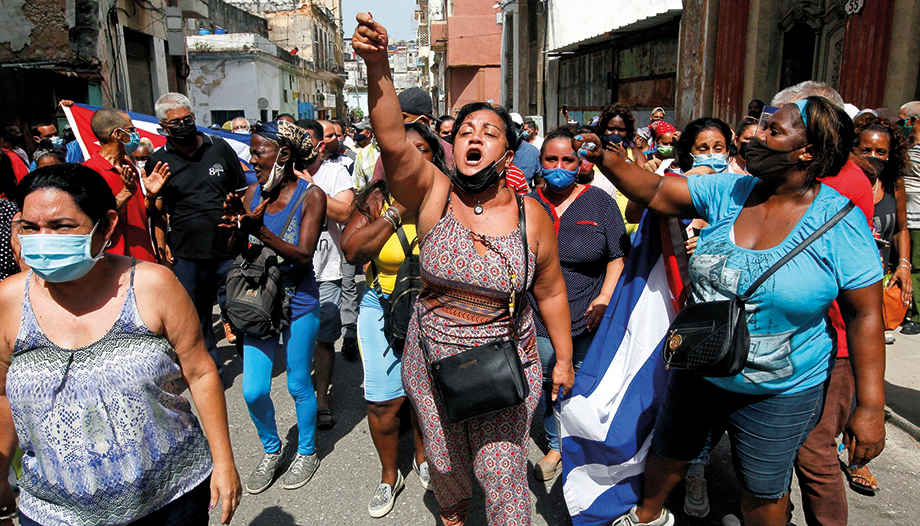In the repression of the demonstrations, several young Cuban Catholics were arrested. Among them were Isabel María Amador Pardías and Karem del Pilar Refeca Remón, in Bayamo, members of the youth pastoral; Serguis González Pérez, son of deacon Sergio González of the San Nicolás de Bari church in Mayabeque; Evelio Bacaro, bursar and organist of the same church; Jonathan E. Porto Dilut, 24 years old and a member of the Christian Liberation Movement (MCL) arrested in Palma Soriano; Neife Rigau, a young Catholic who participates in pastoral work, designer of the independent media The Hour of Cubawas arrested on July 11 along with journalist Henry Constantín and photographer Iris Mariño. As for the clergy, Father Cástor Álvarez Devesa, a priest of the archdiocese of Camagüey, who was beaten, and seminarian Rafael Cruz were arrested. The prompt echo of the international media caused them to be sent home a few days later.
They are a reminder of the events of just over three decades ago. In 1989 communism was overthrown in Europe thanks to the leadership of St. John Paul II and his teaching on the defense of human dignity in the face of any totalitarianism that threatened our free condition as children of God. The teachings of the Polish Pope never spoke of politics, but focused on highlighting and communicating what it was to be a person in their authentic reality, free to choose the good, and heirs of a dignity that no totalitarian movement could hurt or control. The Catholic Church in Cuba is a faithful reflection of that movement that brought down the walls and recovered the sovereignty and freedom of Europeans on the other side of the iron curtain. For this reason, the members of the Church are sowers of peace, but not deaf to the pain of the people. The repression that Catholics regularly suffer has its key to the defense of human dignity, which makes them uncomfortable witnesses and stimulators of questions to the authorities, who are only in favor of staying in power, eliminating dissidence.
The Bishops of Cuba, in a July 12 communiqué wrote: "Violence begets violence, today's aggressiveness opens wounds and feeds resentment for tomorrow that will be hard to overcome, so we invite everyone not to encourage the crisis situation, but with serenity of spirit and goodwill, to exercise listening, understanding and tolerance attitude, which takes into account and respects the other to find ways together for a fair and appropriate solution"..
The Latin American bishops of the Latin American Episcopal Council, through their president, Monsignor Miguel Cabrejos Vidarte, sent their solidarity to the Cuban episcopate with the following words: "From the Latin American Episcopal Council we join you in your call so that the response to the demands of the population is not immobility that contributes to the continuity of the problems, without solving them, nor the hardening of positions that could harm everyone.".
The Caribbean island already had its first "black spring" in 2003, when 75 human rights defenders were sentenced to harsh prison terms. The cause was their participation as organizers of the Varela Project together with Oswaldo Payá, who organized the Varela Project, protected by the Cuban constitution, which allowed him to collect the necessary signatures to present the government with a request for changes in the legislation. The 11,000 signatures were presented and visualized the organizational strength of the political organization founded underground by Oswaldo Payá, the MCL, which was never a confessional organization but whose principles were based on the social doctrine of the Church and the liberating message of the Gospel. Its main leaders were expelled from the island, and in 2012 Oswaldo Payá and Haroldo Cepedo died in a strange car accident that remains unclear. Their daughter Rosa Mª Payá continues the struggle from Cuba DecidesThe Cuban-American exile population is 2.5 million in the United States alone, in a 65 % in Florida.
In the past, the strong communist repression stopped dissidents before they could become a real danger, since they could not conveniently spread their ideas. Nowadays, however, tourism, the island's only real industry, has brought the reality of the rest of the world closer to Cuba, a branch of the economy that has now collapsed because of the covid-19. Economic emigration provides support and news, and they no longer depend on channels controlled by the authorities. New technologies have given access to small cell phones, which has provided the new Cuban generation with the ability to connect with the world outside the island and organize undetected. In 2003 there were dozens of activists, in 2021 it is the entire people who have taken to the streets to demand that the island ceases to be a prison for its inhabitants. Even the bards of the regime of yesteryear, the former privileged of Fidel, Pablo Milanés and Silvio Rodríguez, join the cry of the people against the communist regime.
Full Professor, Universidad CEU San Pablo









